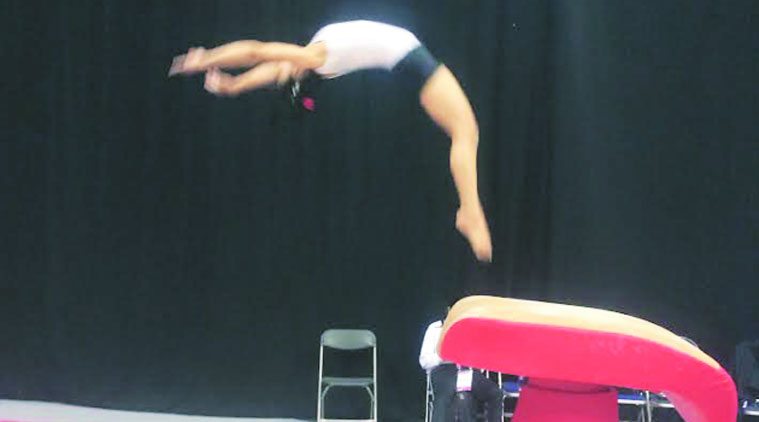Dipa Karmakar misses podium at World Gymnastics Championships, but puts India on the pedestal
 Dipa Karmakar scored 14.683 points for a fifth-place finish.
Dipa Karmakar scored 14.683 points for a fifth-place finish.
Eight different countries were represented by eight vaulters in the finals of the event at the Gymnastics World Championship. The packed SSE Hydro at Glasgow cheered for the current great American Simone Biles as she stomped onto the stage and walked off with a swagger towards the rampway of the Vault. The Russian Maria Paseka was similarly greeted as was the vaulting specialist from North Korea Un Jong Hong. They were expected to strut out from the wings and take their place at the start.
The loudest roar, one that backs an underdog without any partisan fervour, one that welcomes a special talent into the fold, though, was reserved for India’s Dipa Karmakar. As she made a grinning entry on the stage with the tricolour fluttering on a giant screen at Gymnastics’ biggest global meet and strided confidently to take her place, the crowd hit a crescendo. India had arrived in Gymnastics.
Glasgow knew of this girl. Glasgow had clapped hard when coming from nowhere last August she had clinched the Commonwealth Games bronze. Glasgow was welcoming global gymnastics’ absolute newbie with familiarity, and they loved that she was an Indian, turned out smartly in a deep sky blue-and-white leotard suit on the big day.
“Everyone knows me now as the “vaulter” and especially for my Produnova (her first vaulting jump, a Russian speciality with the world’s highest difficulty of 7.0). So I am happy that now whole world knows that Indians are also into gymnastics. Today in the stadium, when I came out, people were astounded that an Indian has qualified for finals. Even Romania hadn’t qualified. I think they were excited for me,” Dipa would say later.
Going eighth on the vault, Dipa would launch into her handspring and double somersault, and though the power wasn’t enough to get the desired elevation in the air, she would land low-chested and on her haunches without touching the floor. The difficulty of the Produnova lies as much in the aerial rotations as in the landing, so she would be scored 15.300 (of a maximum 17.000) — to match her score that clinched the Asian championship medal earlier.
On the subsequent second vault, the Tsukahara 720, Dipa would twist alright but lose her way stepping out of the lane and be docked points immediately – a 0.3 penalty that would yield a lowly 14.066 (Difficulty 6.0), for an average of 14.683 and a fifth position in the world. It was 0.983 points off the gold, and 0.858 short of the bronze medal.
No federation
The finishing finesse is utterly lacking in Karmakar’s jumps, and the trembling landings often leave first-time watchers doubting her prowess against girls who stick them landings clean and finish with a poised flourish. But the Indian is onto a very challenging path towards medalling at big events (choosing two of the toughest jumps), and perhaps how she started is more eye-popping than how she finishes the effort.
“There is no federation in India right now,” coach Bisweshwar Nandi says (“Federation ka koi astitva hi nahi hai”), a fact so staggering when juxtaposed against the highly sophisticated support systems for the rest of the finalists here, that India looks like one right oddball in the mix at Glasgow. The US, Great Britain, North Korea (with a great tradition in the sport) and Russia took the first four places. The famous fifth one is a country, rather notoriously, without a functioning national federation. “SAI helped set up the camp, so we could reach here,” the coach adds.
Since the time the federation erupted into factions, there is no governing body for the sport. When Sports Minister Sarbananda Sonowal visited his native north east and hopped across from Assam to Tripura, Dipa, her coach Nandi and father Dulal had met him and requested him to allow for a camp at Delhi. The Sports Authority of India would set up the camp after Dipa had gone 8 months without practice. She would learn the Tsukahara – in 3 months flat heading to the Worlds. “I spoke to all the coaches of the girls who finished 1, 2, 3 and 4. They’ve been doing their vaults for at least 3 years now. So Dipa’s effort wasn’t bad,” the coach would say.
Olympic dream
The effort is right almighty on its own, though the tangibles are tough to state. There’s no medal and no direct qualification to the Olympics. “I’m hearing that even second reserves (Dipa is 26th on list; 24 make the cut) might be invited to the Test event in April at Rio. We’ll know in a month and half from the FIG (international body),” coach Nandi says.
“I am happy. But I really want to play at the Olympics,” Dipa says, her eagerness for the ultimate competition apparent in her tone. “I want to be in the Olympics because I am good enough. Even if it’s the 2020 Games,” says the 22-year-old. “I know if I’d done better on my second vault, I could’ve been 4th. I know I’m very close to being the best,” she repeats. “Maybe if I had more time on the Tsukahara, practicing more, I could’ve medalled,” she says, not too distraught at where she’s finished at her best-ever Worlds.
The top gymnastics nations had ensured team qualifications to Rio, but the individual event finals were Karmakar’s stage to shine. The American great Simone Biles showed technical perfection and the Russian had pedigree. What the Indian had was tremendous hunger to prove herself. Having done that at the World Championships showing she belonged, no one dare tell Dipa Karmakar now that the Olympics is an uphill climb for her.





